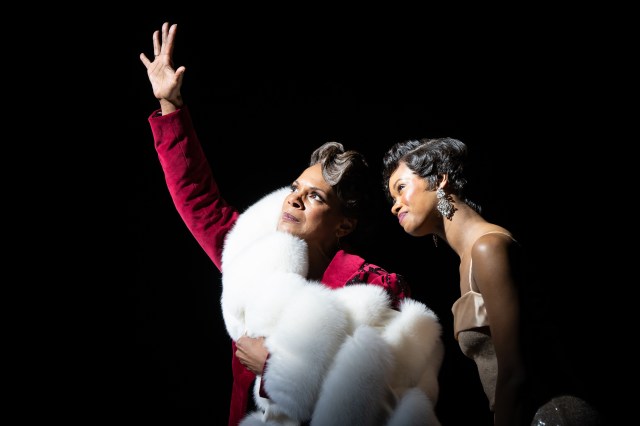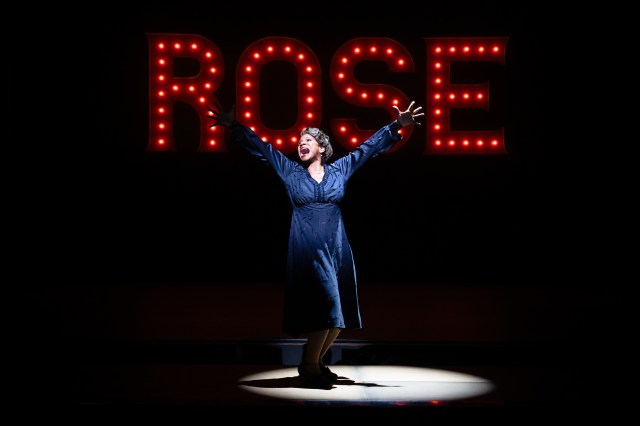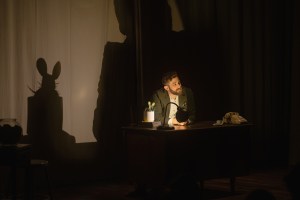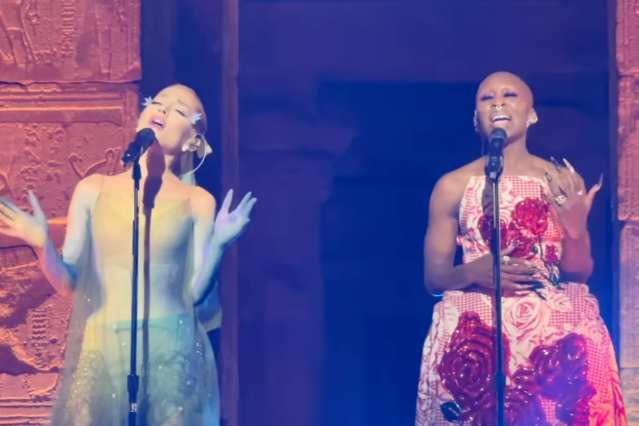Review: An Extraordinary Audra McDonald in a Gripping New Gypsy
George C. Wolfe subtly reframes the best musical ever written for this intense revival at the Majestic Theatre.

(© Julieta Cervantes)
When you’ve seen as many shows as I have, the moments that feel truly unforgettable grow fewer and farther between. In George C. Wolfe’s magnificent revival of Gypsy — which reopens the aptly named Majestic Theatre after Phantom of the Opera‘s 35-year reign — one such moment arrives at the very end. The sight of Audra McDonald, standing on the passerelle of Santo Loquasto’s set after “Rose’s Turn,” bottom lip quivering, whole body shaking, bowing to an imaginary audience, is a once-in-a-lifetime example of pure theatrical magic that I’ll remember to my dying day.
I think audiences will probably fall into two camps with this Gypsy, the first Broadway production since the deaths of book writer Arthur Laurents and lyricist Stephen Sondheim, and the first to entirely forgo using Jerome Robbins’s original choreography. The Gypsy purists may dismiss director George C. Wolfe’s subtle yet compelling reframing of the story to highlight the Black American experience at the turn of the 20th century. They might gripe that Audra “can’t sing it” or doesn’t embody the human bulldozer many believe Mama Rose requires. The other camp will be floored by the fresh perspective for precisely those reasons. I was floored.
McDonald isn’t a Rose in the vein of Patti LuPone, a relentless gorgon hellbent on turning one of her daughters into a star, or even Bernadette Peters, whose Rose was a wistful coquette who missed her chance. McDonald’s Rose is rooted in a single line from “Some People”: “If I die, it won’t be from sitting. It will be from fighting to get up and get out.” She’s a Black mother in the Jim Crow United States, trying to give her daughters a better life. How does she do that? Through showbiz.
The key lies in the casting of Rose’s youngest daughter, June. Played by the precocious Jade Smith as a child (at my performance) and the exceptional Jordan Tyson as an embittered adult, June is mixed-race, with blonde curls and features light enough to pass, allowing her to secure bookings in vaudeville houses. Rose pours all her hopes and ambitions into June, while relegating her elder daughter, the darker-skinned, natural-haired Louise (portrayed by Kyleigh Vickers as a youngster and the fascinating Joy Woods as an adult), to the background. Toni-Leslie James’s mature costumes, and especially Mia Neal’s wigs, tell a whole story on their own.

(© Julieta Cervantes)
More than ever, this Gypsy feels like a play with songs. Without altering a word, Wolfe and his team (which also includes Camille A. Brown providing new choreography) uncover layers that never existed within the musical-theater’s most sacred text. As the years go by, Rose gradually replaces June’s young Black backup dancers with nondescript white men (likely to improve their chances of getting booked), takes on candy salesman Herbie (the eternally excellent Danny Burstein) as both agent and boyfriend, and, in her relentless drive to prove herself in a world that doesn’t want her, ultimately alienates everyone in her life.
That’s not to say the musical elements are overlooked. Jule Styne’s score receives lush treatment, with conductor Andy Einhorn leading 25 musicians in the original Sid Ramin/Robert Ginzler orchestrations (Scott Lehrer’s sound design is so finely tuned that every melodic nuance from the pit shines). Woods and Tyson bring a wrenching harmony to “If Momma Was Married,” their voices striving for the unattainable. The strippers — Lesli Margherita as the balletic Tessie Tura, Lili Thomas as the horn-tootin’ Mazeppa, and Mylinda Hull as the buxom Electra — deliver a hilarious “You Gotta Get a Gimmick,” a number that customarily stops the show cold, and theirs is no exception.
Even those firmly in Camp Audra, as I am, might notice that the belt-heavy songs don’t always suit her voice. This is most apparent in “Some People,” which falls right on her break between head and chest voice and creates the impression of a struggle that isn’t as severe as it seems. The smaller, more intimate numbers like “You’ll Never Get Away From Me” and “Small World” fit her just beautifully.
What some may feel is lacking in McDonald’s vocal performance is more than compensated for by her masterful physical storytelling. Rose, reeling from June’s rejection, grabs Woods’s Louise by the throat during “Everything’s Coming Up Roses,” physically wrestling her shattered dreams onto her remaining daughter, while Burstein’s Herbie looks on in silent horror. McDonald’s composed exterior fractures as the curtain falls, unravelling even further when she volunteers a shellshocked Louise to perform her first strip routine, which pushes Herbie to his breaking point. Burstein, ever the hopeful optimist clinging to the idea that Rose may one day marry him, lets his heart break in real time, a devasting counterpoint to Rose’s relentlessness.
By centering the production so heavily on Rose, Woods is underserved as Louise. Her climactic strip sequence lacks a clear arc; instead of evolving gradually from wallflower to celebrity, Woods instantly becomes the next Josephine Baker. She effectively captures both sides of the character, Louise’s awareness of her lack of talent and her sense of having stumbled into stardom, but the absence of a gradual build diminishes the emotional impact.
The problem is exacerbated by the absence of a compelling visual language throughout. Robbins’s choreography remains unsurpassed for a reason, and while Brown’s dances have their moments, they fail to achieve the singular impact of the legendary strobe light transition, which is notably absent here. Coupled with the dinginess of Loquasto’s set and the muted lighting by Jules Fisher and Peggy Eisenhauer, the result is a drabness that undermines the sheer magnetism of the performances.
Regardless, there’s enough to admire about this Gypsy that you will leave feeling like you’ve gotten your money’s worth, and then some. Wolfe honors the brilliance of the material while finding a new way in, and those willing to go for the ride will find great rewards. And how lucky are we that we get to see Audra McDonald, a living legend, push herself to even further heights? The whole production is a rare privilege; you either got it or you ain’t — and this one’s got it.

(© Julieta Cervantes)









